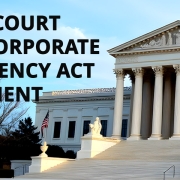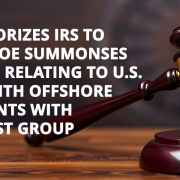Supreme Court Allows Corporate Transparency Act Enforcement
Requirement For Banks & Financial Institutions To Report Beneficial Ownership Information Of Entity Accountholders Back In Force By The Highest Court.
The Federal government in its efforts to crack down on illicit finance and enhance transparency on September 29, 2022 issued a final ruling establishing a beneficial ownership information reporting requirement, pursuant to the Corporate Transparency Act (CTA). This rule will require most corporations, limited liability companies, and other entities created in or registered to do business in the United States to report information about their beneficial owners – the persons who ultimately own or control the company – to the United States Treasury Department’s Financial Crimes Enforcement Network (FinCEN). These filings are commonly referred as “BOI reports”.
Law Invalidated Less Than One Month Before Reporting Deadline
On December 3, 2024 Judge Amos L. Mazzant III of the US District Court for the Eastern District of Texas issued the injunction at the request of a family-run firearms and tactical gear retailer, called Texas Top Cop Shop Inc., among other co-plaintiff businesses and the Libertarian Party of Mississippi. Their lawsuit alleged that the CTA falls outside of Congress’s powers to regulate interstate and foreign commerce because it regulates incorporated entities regardless of whether they engage in commercial activity.
In issuing the Court’s Opinion (Texas Top Cop Shop, Inc. v. Garland, E.D. Tex., No. 4:24-cv-00478, 12/03/2024), the Court agreed that the law’s requirements exceed Congress’s commerce authority. “For good reason, Plaintiffs fear this flanking, quasi-Orwellian statute and its implications on our dual system of government,” Mazzant wrote.
The government appealed the preliminary injunction granted by the district court that enjoins enforcement of the CTA to the 5th Circuit. On December 17, 2024, the U.S. District Court for the Eastern District of Texas issued an Order denying the government’s motion to stay the nationwide preliminary injunction. It is likely that this Order is the last formal decision on the CTA prior to December 31, 2024 that would require filing (at least filing prior to December 31, 2024.
Then on December 23, 2024, the 5th Circuit Court of Appeals issued its Order granting the Government’s motion to stay the preliminary injunction – meaning that the enforcement of the CTA continues despite the pending appeal before said Court, but with all this conflicting activity occurring at year’s end, on December 23, 2024 FinCEN announced a series of short filing extensions to those companies with upcoming due dates:
- Companies created or registered prior to January 1, 2024, now have until January 13, 2025, to file their initial BOI reports with FinCEN. This is an extension from the original January 1, 2025, deadline.
- Companies with an original reporting deadline between December 3, 2024, and December 23, 2024, these companies now have until January 13, 2025, to file.
- Companies created or registered between December 3, 2024, and December 23, 2024, have an additional 21 days from their original filing deadline to submit their reports.
For Companies Created or Registered On or After January 1, 2025: These companies must file their initial BOI reports with FinCEN within 30 days of receiving actual or public notice that their creation or registration is effective.
But Then The 5Th Circuit Court Of Appeals Flip-Flops Its Position Reinstating The Nationwide Injunction Staying Enforcement
In another Order issued on December 26, 2024, the 5th Circuit vacated the portion of its own December 23rd order that granted the Government’s motion to stay the preliminary injunction in order to “preserve the constitutional status quo”. This means that compliance with the CTA (BOI Reporting) is optional again.
Supreme Court Weighs In And Lifts The Stay – CTA (BOI Reporting) Is Now Required.
On January 23, 2025 the U.S. Supreme Court ruled that it will allow the government to implement the CTA thus requiring millions of businesses to file information on their beneficial owners. The justices stayed the injunction blocking the enforcement of the CTA, which requires US entities to disclose who owns and controls their businesses. The move paves a path for the government to move ahead with enforcement of the law while its merits are being debated in the US Court of Appeals for the Fifth Circuit. That court plans oral arguments March 25.
Here is the sequence/timeline and status:
- District Court holds CTA is unconstitutional and issues preliminary injunction preventing enforcement of the CTA.
- Government immediately files motion to stay the preliminary injunction pending appeal (i.e. enforcement for the CTA continues).
- On 12/17/2024, District Court denies Government’s motion to stay the preliminary injunction pending appeal (i.e. no enforcement of the CTA allowed)
- On 12/23/2024, 5th Circuit Court of Appeals grants the Government’s motion to stay the preliminary injunction (i.e. enforcement of the CTA continues).
- On 12/26/2024, 5th Circuit Court of Appeals vacates the portion of the Order that allowed the Government to enforce the CTA.
- On 01/23/2025, the U.S. Supreme Court grant’s Government’s motion to stay the preliminary injunction pending appeal (i.e. enforcement of the CTA allowed)
Clearly the 5th Circuit will not be issuing its opinion until sometime after the schedule oral arguments of March 25, 2025 but it is likely that whatever decision is rendered, it will be appealed to the U.S. Supreme Court.
Purpose Of Reporting
Designed to protect U.S. national security and strengthen the integrity and transparency of the U.S. financial system, FINCEN stated that this ruling will help to stop criminal actors, including oligarchs, kleptocrats, drug traffickers, human traffickers, and those who would use anonymous shell companies to hide their illicit proceeds.
“For too long, it has been far too easy for criminals, Russian oligarchs, and other bad actors to fund their illicit activity by hiding and moving money through anonymous shell companies and other corporate structures right here in the United States,” said Acting FinCEN Director Himamauli Das. “This final rule is a significant step forward in our efforts to support national security, intelligence, and law enforcement agencies in their work to curb illicit activities. The final rule will also play an important role in protecting American taxpayers and businesses who play by the rules, but are repeatedly hurt by criminals that use companies for illegal reasons.”
Reporting Companies
The CTA broadly defines a “reporting company” as any corporation, limited liability company, or other similar entity created by filing a document with the secretary of state or similar office in any state or territory or with a federally recognized Indian Tribe, or formed under the laws of a foreign country and registered to do business in the United States.
Entities Not Required To Be Reported
There are certain entities that are excepted from being reported: (1) entities in certain regulated industries that already are subject to beneficial ownership reporting, (2) publicly traded companies, (3) investment vehicles operated by investment advisors, nonprofits, and government entities, and (4) “qualified exempt entities”. A “qualified exempt entity” is an entity that (a) employs more than 20 employees; (b) filed in the previous year a tax return demonstrating more than $5 million in gross receipts or sales; and (c) has an operating presence at a physical office within the United States.
Beneficial Owners and the Information to Report
The CTA defines a “beneficial owner” of an entity as any individual who, directly or indirectly, (1) exercises substantial control over the entity or (2) owns or controls not less than 25% equity in the entity. The rule expressly excludes certain individuals from the definition of beneficial ownership, including (1) a minor child (as long as the child’s parent’s or guardian’s information is reported); (2) an individual acting as an intermediary or agent on behalf of another; (3) a person whose control over a reporting company derives solely from their employment; (4) an individual whose only interest in a reporting company is through a right of inheritance; or (5) a creditor of a reporting company (unless they qualify as a “beneficial owner” through substantial control or equity ownership).
What Information Gets Reported
In each report to FinCEN, a reporting company must provide each beneficial owner’s name, date of birth, residential or business address, and a unique identifying number from an acceptable identification document (such as a state driver’s license or passport).
Effective Date Is January 1, 2024.
The rule is effective January 1, 2024. Reporting companies created or registered before January 1, 2024, will have one year (until January 1, 2025) to file their initial reports, while reporting companies created or registered after January 1, 2024, will have 30 days after creation or registration to file their initial reports. Once the initial report has been filed, both existing and new reporting companies will have to file updates within 30 days of a change in their beneficial ownership information.
The reporting rule is one of three rulemakings planned to implement the CTA. FinCEN will engage in additional rulemakings to: (1) establish rules for who may access beneficial ownership information, for what purposes, and what safeguards will be required to ensure that the information is secured and protected; and (2) revise FinCEN’s customer due diligence rule. In addition, FinCEN stated it continues to develop the infrastructure to administer these requirements, including the information technology system that will be used to store beneficial ownership information in accordance with the strict security and confidentiality requirements of the CTA.
FinCEN Issues Guide to Assist Small Businesses with Beneficial Ownership Reporting: The Treasury Department’s Financial Crimes Enforcement Network (FinCEN) published a Small Entity Compliance Guide https://www.fincen.gov/sites/default/files/shared/BOI_Small_Compliance_Guide.v1.1-FINAL.pdf to assist the small business community in complying with the beneficial ownership information (BOI) reporting rule that became effective on January 1, 2024 under the Corporate Transparency Act.
Penalties for Violating CTA
The willful failure to report complete or updated beneficial ownership information to FinCEN, or the willful provision of or attempt to provide false or fraudulent beneficial ownership information may result in a civil or criminal penalties, including civil penalties of up to $500 for each day that the violation continues, or criminal penalties including imprisonment for up to two years and/or a fine BOI Ownership Information report may be held accountable for that failure. However, the CTA contains a safe harbor from such civil and criminal liability for the submission of inaccurate information if the person who submitted the report voluntarily and promptly corrects the report within 90 days.
Don’t Take The Chance And Lose Everything You Have Worked For.
Protect yourself. While the law is put on hold for now, you can expect the laws regarding customer due diligence requirements for financial institutions will also be updated to conform to the CTA as the CTA will be providing a new means for a financial institution to verify a customer’s “Know Your Customer” information. If you are selected for an audit, stand up to the IRS by getting representation. Tax problems are usually a serious matter and must be handled appropriately so it’s important to that you’ve hired the best lawyer for your particular situation. The tax attorneys at the Law Offices Of Jeffrey B. Kahn, P.C. located in Orange County (Irvine), Los Angeles and elsewhere in California are highly skilled in handling tax matters and can effectively represent at all levels with the IRS and State Tax Agencies including criminal tax investigations and attempted prosecutions, undisclosed foreign bank accounts and other foreign assets, and unreported foreign income. In addition, tax attorneys at the Law Offices Of Jeffrey B. Kahn, P.C. can complete or update BOI reporting for your business. Additionally, if you are involved in cannabis, check out what a cannabis tax attorney can do for you. And if you are involved in crypto currency, check out what a bitcoin tax attorney can do for you.











 Follow
Follow Follow
Follow